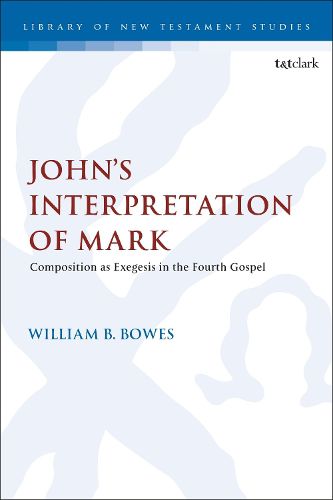Readings Newsletter
Become a Readings Member to make your shopping experience even easier.
Sign in or sign up for free!
You’re not far away from qualifying for FREE standard shipping within Australia
You’ve qualified for FREE standard shipping within Australia
The cart is loading…






William B. Bowes investigates the Fourth Gospel as a creative reworking of Mark, situating John within the vibrant literary culture of late Second Temple Judaism. Rather than treating John as an isolated voice, Bowes argues that the Evangelist adopts compositional practices akin to Jewish texts categorized as Rewritten Scripture-works that extend authoritative tradition through interpretive rewriting. This approach reframes John not as independent but as an inspired interpreter who reshapes Mark for a later context and audience.
Bowes begins by reviewing scholarly paradigms on John's use of Mark and mapping these against Jewish methods of source reuse. Bowes then offers five detailed case studies comparing Johannine episodes with their Markan counterparts and with analogous Jewish texts. These include John 1's portrayal of John the Baptist alongside Jubilees 1; the Temple disturbance in John 2 with Mark 11 and the Temple Scroll; the feeding of the five thousand in John 6 with Mark 6 and the Genesis Apocryphon; the Bethany anointing in John 12 with Mark 14 and Philo's De Vita Mosis; and the Roman trial narrative in John 18-19 with Mark 15 and Josephus' Jewish Antiquities. Through these comparisons, Bowes demonstrates how John employs additions, omissions, rearrangements, and theological reframing, all techniques characteristic of Jewish exegetical rewriting.
By situating John's Gospel within this Jewish literary milieu, Bowes illuminates its compositional logic and interpretive purpose, offering a fresh paradigm for understanding the origins of the Fourth Gospel and its complex interplay of similarity and difference with Mark.
$9.00 standard shipping within Australia
FREE standard shipping within Australia for orders over $100.00
Express & International shipping calculated at checkout
Stock availability can be subject to change without notice. We recommend calling the shop or contacting our online team to check availability of low stock items. Please see our Shopping Online page for more details.
William B. Bowes investigates the Fourth Gospel as a creative reworking of Mark, situating John within the vibrant literary culture of late Second Temple Judaism. Rather than treating John as an isolated voice, Bowes argues that the Evangelist adopts compositional practices akin to Jewish texts categorized as Rewritten Scripture-works that extend authoritative tradition through interpretive rewriting. This approach reframes John not as independent but as an inspired interpreter who reshapes Mark for a later context and audience.
Bowes begins by reviewing scholarly paradigms on John's use of Mark and mapping these against Jewish methods of source reuse. Bowes then offers five detailed case studies comparing Johannine episodes with their Markan counterparts and with analogous Jewish texts. These include John 1's portrayal of John the Baptist alongside Jubilees 1; the Temple disturbance in John 2 with Mark 11 and the Temple Scroll; the feeding of the five thousand in John 6 with Mark 6 and the Genesis Apocryphon; the Bethany anointing in John 12 with Mark 14 and Philo's De Vita Mosis; and the Roman trial narrative in John 18-19 with Mark 15 and Josephus' Jewish Antiquities. Through these comparisons, Bowes demonstrates how John employs additions, omissions, rearrangements, and theological reframing, all techniques characteristic of Jewish exegetical rewriting.
By situating John's Gospel within this Jewish literary milieu, Bowes illuminates its compositional logic and interpretive purpose, offering a fresh paradigm for understanding the origins of the Fourth Gospel and its complex interplay of similarity and difference with Mark.